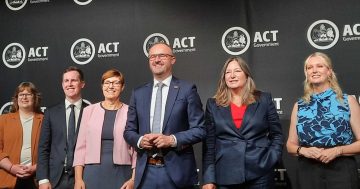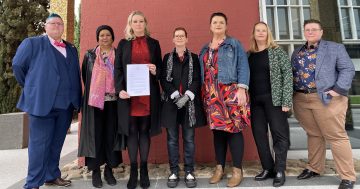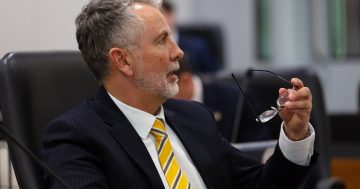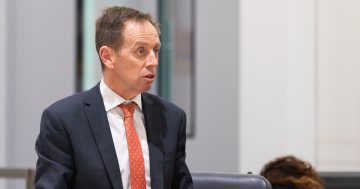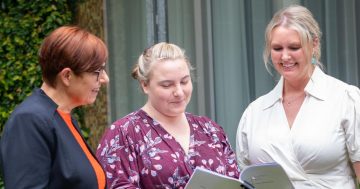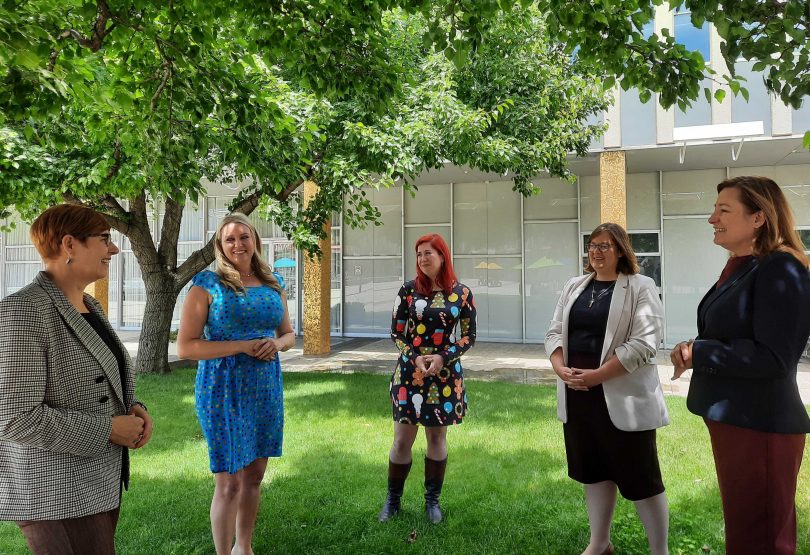
Labor MLAs Rachel Stephen-Smith, Marisa Paterson, Tara Cheyne, Suzanne Orr and Yvette Berry outside the Legislative Assembly: strength in numbers. Photo: Ian Bushnell.
For new Labor MLA Marisa Paterson, the formation of the ACT Government’s first Women’s Caucus holds particular importance, having had first-hand experience of an issue that continues to blight workplaces.
Dr Paterson, former director of the Centre for Gambling Research at the Australian National University, told the Legislative Assembly in her maiden speech she suffered two years of sexual harassment, stalking and bullying when working with a prominent New Zealand academic.
Like many women, she believed she could lose her job and jeopardise her career if she complained.
READ ALSO: “The complaint process failed me,” new MLA opens up about sexual harassment
“My marriage had ended, and I was on my own with three very young children. I very acutely felt the pressure on my income, being the only income [earner],” she said in her speech.
Even when she did make a formal complaint, there was no investigation, and her employer only acted after she went to the media. The man has since resigned.
Dr Paterson said coming into the Assembly, where women are in the majority, made her feel incredibly proud and that the Women’s Caucus, consisting of Labor and Greens women MLAs, would be a fantastic opportunity to do some impressive policy work over the next four years.
”I really see equality in the workplace as a major issue and addressing sexual harassment is what we need do to be doing,” she said.
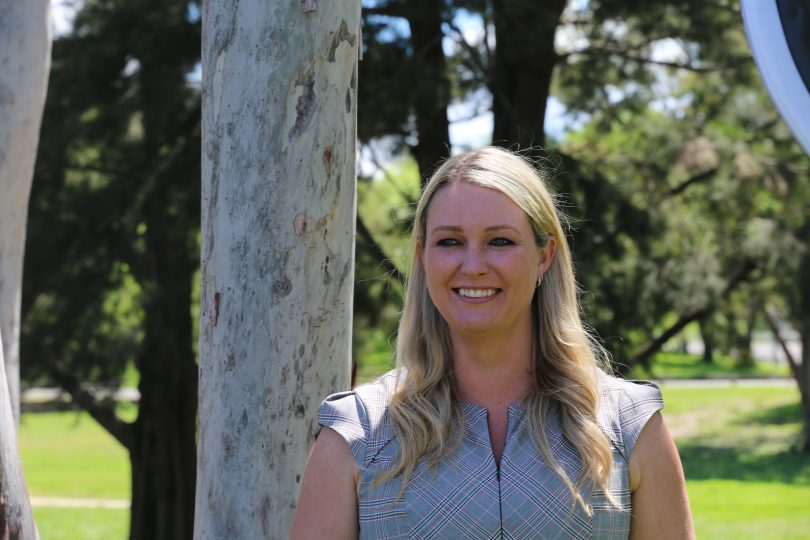
Marisa Paterson says “addressing issues as a caucus will be really powerful”. Photo: Dominic Giannini.
Dr Paterson said the new Caucus was also an opportunity to change the way policy and decisions were made.
”It’s about changing the lens in which we make decisions and creating space for new ideas,” she said. ”Addressing issues as a caucus will be really powerful.”
Deputy Chief Minister Yvette Berry, who established the Caucus, said the election result had put more women into the Assembly than ever before and they would be able to share their diverse life experiences and bring the voices of women and girls into the parliament.
The women would also be role models for girls in a world where the perception persists that political leaders were male, she said.
Ms Berry said that only recently she had been told how a woman’s young daughter had expected the Deputy Chief Minister to be man when her mother said she would be meeting her.
”We’re changing that story right now because of the extraordinary number of women elected to the parliament,” she said. ”More women in these leadership positions will lead to change.”
READ ALSO: For all the pressure, Christmas, like life, is still worth celebrating
Ms Berry said the pandemic had highlighted how women had been disproportionately affected by the shutdowns and experienced more violence in the home.
She said women had more frequently taken on additional caring responsibilities, and were more likely to be employed in occupations that are insecure and low paid.
As a result, she had asked the Office for Women to begin a gendered analysis of the economic impacts of the pandemic on the community.
Ms Berry said the government chalked up achievements such as 40 per cent of women being on boards and making sporting change rooms more inclusive, but the Caucus would work for the implementation of Second Action Plan under the ACT Women’s Plan 2016-2026.
She said this would address workplace equity, health and housing issues, and keeping women and girls safe.
”Domestic and family violence and sexual assault still remain insidious issues that we’ve never been able to get on top of,” Mr Berry said.
She believes the women can change the way politics works and it was not simply about exercising power, traditional, soft or otherwise.
”It’s not about combative behaviour, not about being any weaker, it’s about joining together and collaborating and making the change,” she said.
While Opposition MLAs had not been invited to join the caucus, Ms Berry said she had worked closely with Liberal women and would continue to do so.
”I’ve written to them and invited them to the conversation,” she said.
Opposition Leader Elizabeth Lee is supportive but wants to see action, not just words.












